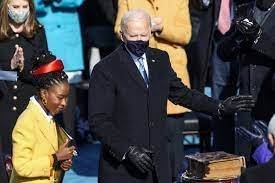
Amanda Gorman, the nation’s first National Youth Poet Laureate, spoke out Tuesday against what she described as a book ban after access to the poem she recited at President Joe Biden’s inauguration was limited at a Florida school.
Miami-Dade County Public Schools moved “The Hill We Climb” to the middle school section of the library after a parent filed a formal objection to the work, according to documents obtained by the Florida Freedom to Read Project and shared with media. The Miami Herald first reported the story.
“Unnecessary #bookbans like these are on the rise, and we must fight back,” Gorman said in a post on Facebook that accompanied a one-page statement in which she said her book had been banned from an elementary school.
In a statement, the district said no literature had been banned or removed.
“It was determined at the school that ‘The Hill We Climb’ is better suited for middle school students and, it was shelved in the middle school section of the media center. The book remains available in the media center,” the statement said.
A review of five titles available at the library at Bob Graham Education Center in Miami Lakes was triggered after a parent of two students filled out forms requesting the titles be removed “from the total environment,” according to the documents obtained by the Freedom to Read Project, a group founded by public school parents and dedicated to fighting what it calls book bans in the state.
The review, by a committee composed of multiple educators and others connected to the school, resulted in “The Hill We Climb” being moved to the middle school section of the school’s library, which is formally called its media center, the Miami-Dade district said.
The committee also determined at least two other titles it reviewed should be shifted to the middle school shelves, according to the documents.
The documents were obtained after the Freedom to Read Project filed a public records request in February, and include the parent’s challenge as well as written conclusions from the review committee, said Raegan Miller of the group.
Miller decried the school’s restriction because, she said, children seeking knowledge on their own free time, and who might not be able to easily purchase books outright, should be encouraged.
“This isn’t classroom instruction,” she said. “This is kids who are seeking more information.”
The Miami Herald reported that challenges to book access in Florida school libraries have increased since Gov. Ron DeSantis signed a number of education-related bills into law, including what critics have dubbed the “Don’t Say Gay” bill, which outlaws K-3 instruction related to gender identity and sexual orientation.
DeSantis’ office did not respond to a request for comment.
Last week, Gorman’s publisher, Penguin Random House, joined the nonprofit organization PEN America in filing a lawsuit that challenges what the organization characterized as “unconstitutional book bans” at the Escambia County School District in Florida.
In Miami-Dade County, the parent who requested the titles be reconsidered told the Miami Herald she wasn’t in favor of “eliminating or censoring” books, and said she wanted students to learn “the truth” about Cuba.
The parent did not respond to a voicemail left by NBC News seeking comment.
The objection paperwork for “Cuban Kids” and “Countries in the News Cuba” mentioned “indoctrination,” according to the documents.
In the paperwork for “The ABCs of Black History,” the parent wrote that it contained CRT — the acronym for critical race theory — and “gender ideology,” according to the documents.
The title was tailored for elementary school-level reading, but the committee recommended it be shifted to the middle school shelves because of vocabulary and subject matter, according to the documents.
In the form regarding “The Hill I Climb,” the parent wrote that it was “not educational” and contains indirect “hate messages.” The committee found Gorman’s book has educational value, according to the documents, but it was moved because its vocabulary “was determined to be of value for middle school students.”
In a tweet posted later Tuesday, Gorman said a ban is “any action taken against a book that leaves access to a book restricted or diminished.” The decision to move her book after a parent’s complaint “diminishes the access elementary schoolers would have previously had to my poem,” Gorman said.
Source – NBC News



Share your thoughts